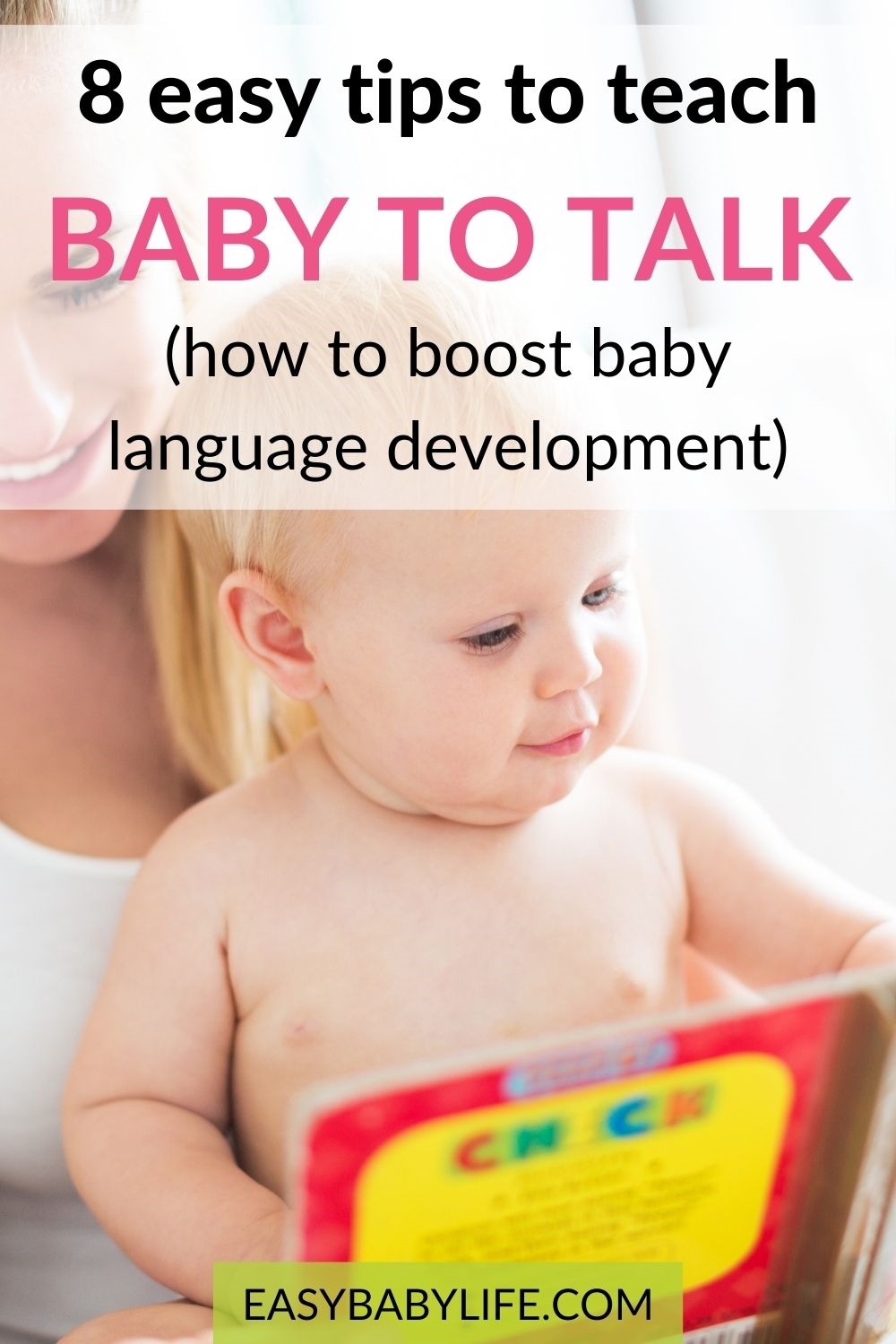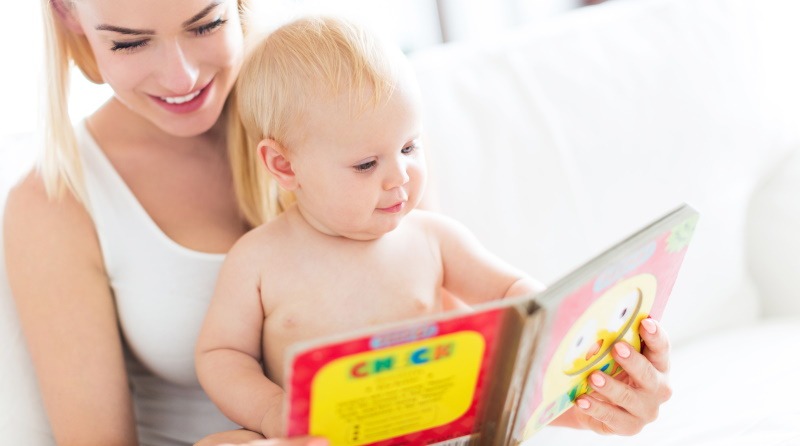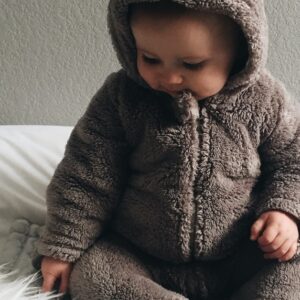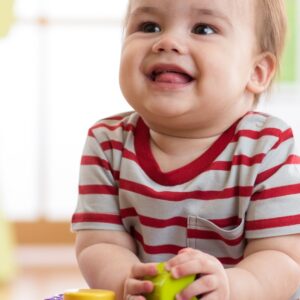When do babies start talking?
Baby language development is a process, for sure, and a fun one to follow! Here you find statistics on when babies start talking in general, language development milestones, signs of development delays, and easy ways to encourage and teach your baby to talk.
It’s not uncommon for parents to wonder when babies start talking. In fact, many parents find themselves asking for advice or searching online about what they can do to encourage their baby to say their first words.
It is such an exciting time in your baby’s life. While it is important to remember that all children are different and that babies’ stages of language development vary, there are certain things you can do as parents to help your baby start to talk.
In this article, we’ll go through the following:
- Stages of Language Development in Babies
- When do Babies Start Talking Actual Words and How Can We Encourage it?
- How to Teach Your Baby to Talk
- When to Worry about your Baby’s Language Development
- Once Your Baby is a Toddler?
- Toys to Boost Baby Language Development
- Takeaways
- Readers’ Questions on Baby Language Development
Stages of Language Development in Babies
Your baby has actually been communicating with you in different ways since they were born using different noises and sounds. While they may not talk right away, babies give out other verbal cues, such as cooing and laughing when they are happy, and crying when they are not happy.
Before saying their first words, babies start to babble. Babbling is an important baby language milestone because it is the beginning of real verbal communication for your little one.
Babies start to experiment with different sounds by moving their mouths and tongues in different ways. It may sound like gibberish for a while, but it means your baby is getting ready to say their first words.
Find below the stages of language development as outlined by ASHA – American Speech Language Hearing Association:
Birth – 3 Months
- Starts to make cooing sounds
- Baby’s cries change for different needs
- Starts to smile
4 – 6 Months
- Coos and babbles when playing
- Makes babbling words such as pa, ba, ma
- Giggles and laughs
- Makes different sounds when happy or unhappy
7 Months – 1 Year
- Babbles longer strings of sounds such as papapa, bababa, mamama
- Points to objects around you
- Uses gestures like waving goodbye or shaking head for no
- Imitates different speech sounds
- Starts to say 1-2 simple words, even if they are not clearly spoken
Around 50% of all babies said their first word by the age of 10 months, and 75% had produced their first word before their first birthday.
When do babies start talking actual words, and how can we encourage it?
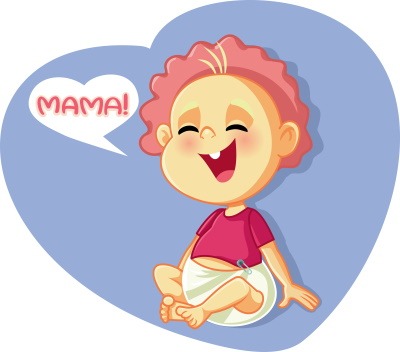 PinSo, when do babies say their first words? It depends on the baby, but generally, most babies say their first words before their first birthday. This is usually in the form of “mama” or “dada,” but it can sometimes vary depending on the sounds the baby is used to hearing.
PinSo, when do babies say their first words? It depends on the baby, but generally, most babies say their first words before their first birthday. This is usually in the form of “mama” or “dada,” but it can sometimes vary depending on the sounds the baby is used to hearing.
In a study of 2279 children (reference below), around 50% of all babies said their first word by the age of 10 months, and 75% had produced their first word before their first birthday.
After babies do say their first word, watch out! Their language will develop quite rapidly, and their vocabulary will continue to expand every day. Babies love to imitate what they see, so they will start to repeat things you say and the sounds you produce.
Remember, you can’t rush a baby’s language development, but there are plenty of things you can do to help your baby talk and make sure they are heading on the right track.
How to Teach Your Baby to Talk
Here you can find eight ways you can help your baby’s language development and help your baby start to talk.
1. Talk to your baby from day one
It may seem obvious but talk to your baby from the day they are born. Or even better, start talking to your baby while still in the womb. Even if they cannot yet talk back, just talk, talk, and talk some more.
Narrate everything you do together throughout the day, from when you wake up to mealtimes, bath time, and bedtime.
The more they are exposed to new and different words and sounds, the better. And the earlier you talk to your baby, the better it is for your baby’s language development.
2. Check for underlying medical conditions
Certain medical conditions can delay a baby’s speech, such as cleft lips or hearing loss, among others. You should check with your pediatrician or a health professional if you are worried about anything in particular, or even just rule these things out if you are concerned.
3. Watch for non-verbal cues
Watch for signs of communication. Your baby may shake their head when finished eating. They may reach when wanting to be picked up. Make sure to respond to these cues and talk to your baby and use words to describe their actions using words.
4. Smile and make eye contact
Babies love eye contact, and they love to see their parents smile. When you talk to your baby, make sure you look into their eyes and speak clearly, and try to keep a smile on your face. Play simple games like “peekaboo” or “where’s mommy?”. You never know when they will give a smile back to you or repeat something back.
5. Name everything
Give everything a name. Name the toys you play with, name the clothes as you dress your baby, and name the people around you. Giving everything a name and repeating those names on a regular basis is a great way to expose your baby to different vocabulary and help their language development.
If your baby does repeat something, make sure to give them praise. Clap your hands and repeat what they have said.
6. Sing to your baby
Most babies respond well to singing as they love their parent’s voices. Sing your baby a lullaby as they are going to sleep, or sing some fun songs or nursery rhymes throughout the day. Use hand gestures along with the words to encourage your baby to respond and communicate back with you.
Attending a baby music class is a fun activity that also helps to stimulate your baby’s language development.
7. Read books every day
Reading to your baby is one of the best habits you can get into, even right from birth, and it is a great way to teach your baby to talk. Although your baby may not follow the words on the page or even notice the images at first, they will hear your voice and the words you use.
Reading can also be a beautiful bonding experience. As your baby gets older, they will start to look at the pages, and you can start to point and name things on the page. Repeat the words over and over, and your little one may just start repeating them back.
8. Keep it fun and interactive
Babies don’t have a large attention span, so switch things up and keep it fun. Sing a few songs, read a book or two, and then go for a walk in the park while chatting away with your baby.
Using different forms of sounds and words on a daily basis will help your baby’s language development and eventually get them talking.
Try not to get into the habit of having the TV on in the background or even popping your little one in front of an educational show. They don’t have any benefits at this age. What babies need is one on one interaction with people.
When to Worry about Your Baby’s Language Development
Sometimes parents find themselves asking, “When should I worry about my baby not talking? Or “Why isn’t my baby talking yet?” It is common to wonder about your baby’s language development and to wonder if they are on the right track.
In general, there could be causes of concern if:
- By 6 months old, your baby doesn’t make eye contact with you, or your baby isn’t trying to communicate with you in any way, such as using sounds and gestures.
- By 9 months old, your baby isn’t babbling
- By 15 months old, does not use at least 3 words.
Remember, these are just rough guidelines, and as mentioned above, all babies develop differently. It could just be that your little one is a late talker and may develop their language a little later.
If you have tried the above strategies on how to help your baby talk, and you are worried that your baby isn’t meeting their language milestones, you should consider speaking with your pediatrician or specialist to seek advice on what you can do.
There could be many reasons for babies not meeting their language milestones, but the sooner you seek specialist advice to identify if there is an underlying issue, the better.
Once your baby is a toddler?
Once your baby grows into the toddler stage, there is much more that you can do to help their language keep developing. Continue reading about here how to help your toddler talk.
Toys to Boost Baby Language Development
Without a doubt, YOU are the best “toy” and sparring partner to teach your baby to talk. Nevertheless, some fun toys to boost your baby’s language development won’t hurt. Here are a few you can consider.
1: Fisher-Price Laugh & Learn Smart Stages Puppy
I was actually a bit hesitant to include this one. My daughter had it and loved it. Me… not so much. Not because it didn’t work, but because it did, LOL! She sang, talked, and pressed buttons. I just got annoyed over the sound of the puppy’s voice…
But it is a good language-learning toy. Check it out here at Amazon.
2. Fisher-Price Laugh & Learn Smart Stages Learn with Puppy Walker
And here is an upgraded version that can be used as a learning toy for both talking and walking.
3: Sensory Books
My children really liked sensory books early. It made them interact more than with just regular picture books. This is a good one.
Takeaways
So the answer to the question “When do babies start talking” is that in most cases (some 75%), they will say their first word before their first birthday.
And for how to teach baby to talk – while baby language development will go through some predictable stages, the more you talk to, sing with, play with, and respond to your baby’s communication efforts, the more you help your baby’s talking.
Readers’ Questions on Baby Language Development
- My 10-month-old is not talking or gesturing – what is wrong?
- My 1 Year 3 Month Baby Can’t Talk or Walk? Toddler Milestones
- 15 Month Old Not Yet Laughing, Walking Or Talking
How do YOU stimulate your baby’s talking? Share your tips and experiences below! :-)
You’ll find more tips and information about baby development here.
Research References

Paula Dennholt founded Easy Baby Life in 2006 and has been a passionate parenting and pregnancy writer since then. Her parenting approach and writing are based on studies in cognitive-behavioral models and therapy for children and her experience as a mother and stepmother. Life as a parent has convinced her of how crucial it is to put relationships before rules. She strongly believes in positive parenting and a science-based approach.
Paula cooperates with a team of pediatricians who assist in reviewing and writing articles.

